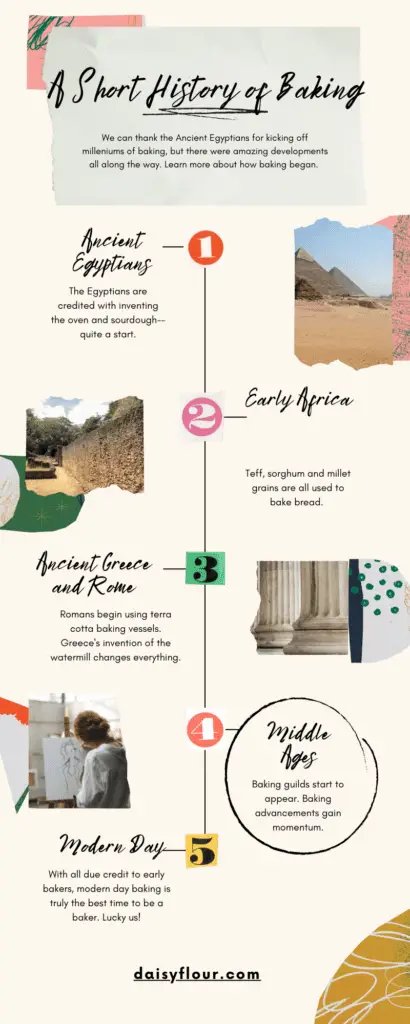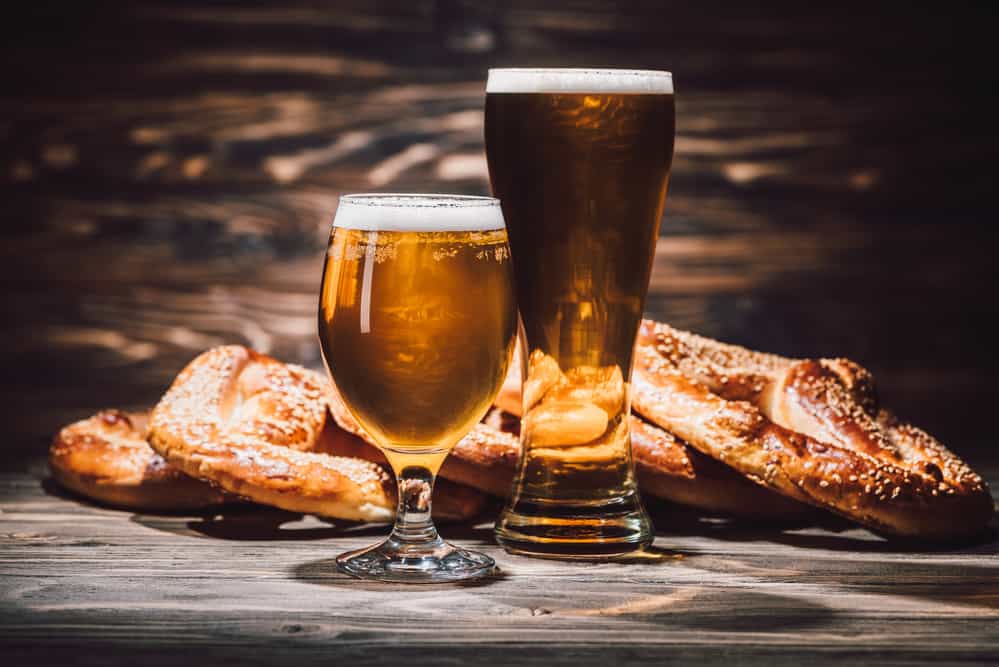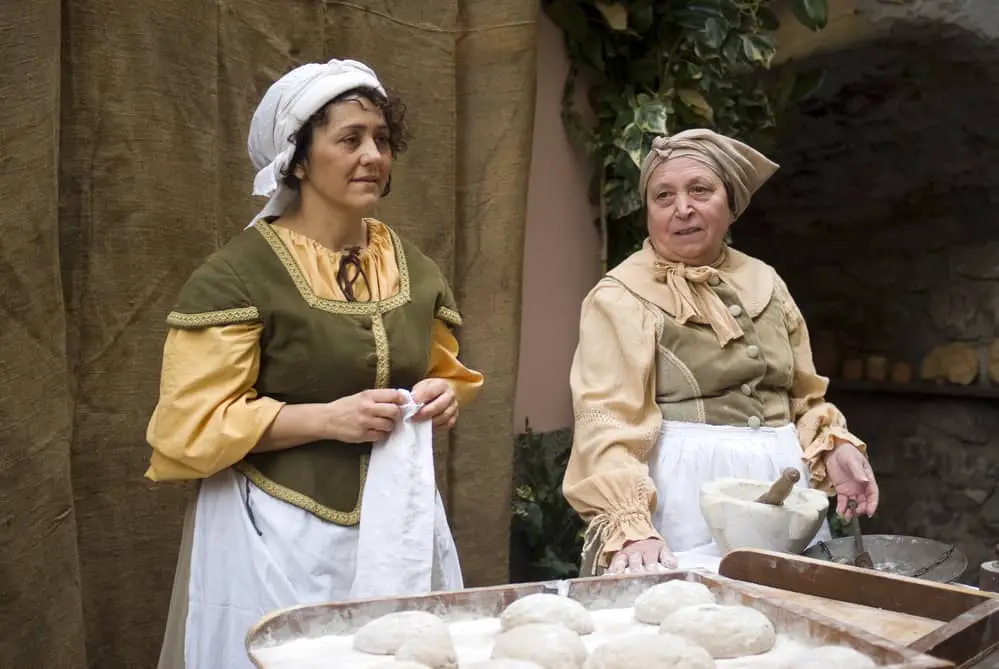Baking is a favorite pastime for people all over the world and for some, it’s a necessity. Baked goods are essentially a universal food as they are eaten in some form in most countries. But what if I told you that baking history dates back thousands of years? How old is the concept of baking, anyway?
The origins of baking can be traced back to the Ancient Egyptians as they were the first civilization recorded of using yeast to intentionally leaven bread in 2600 BCE. Although the Ancient Egyptians were the first recorded civilization, the process of baking bread in any form is an age-old practice.
This topic could be its own book, but in this article, we’re going to give you a crash course on baking history. By the time you finish reading, you’ll have solid foundational knowledge on where the act of baking originated and how it has evolved throughout the centuries.

Brewing and Baking: How Are They Connected?

Food preparation practices by the earliest civilizations were done using fermentation to create a thick, gruel-like consistency in batter that worked well when baked. When made in a thinner form, it was used to brew beer. Barley was typically used in brewing while wheat was more often used to bake early forms of bread.
Both brewing beer and baking bread were closely connected in ancient times as both practices required the process of fermentation. In fact, ancient Egyptians were first credited as fermenting sourdough starters to make bread.
The Origin of Baking: Ancient Egypt
While bread-baking is a time-honored tradition in cultures all over the world, the Ancient Egyptians were known to be the first keepers of sourdough. By using sourdough starters in their recipes, the Ancient Egyptians successfully created more than 50 varieties of bread. With that said, the ancient versions of what we know of as bread were more coarse and flatter than their modern counterparts.
Along with their use of sourdough, Ancient Egyptians are also attributed to being the first to invent the oven. An Egyptian oven would have been cylindrical and was made of baked clay from the Nile River. These ovens were divided into two parts: the firebox (lower section) and the baking chamber (upper section). When a person would bake bread, the dough would be placed in a hole at the top of the oven.
Baking History: Early Africa
People in Early Africa harvested wild grain and nuts, gathered berries and other fruits, and hunted animals for meat. At around 7000 BCE, Early African peoples tended cows and milked them to created cheese and yogurt.
In circa 4000 BCE, Ethiopians and Eretrians used teff to baked bread and Sudanese people used millet and sorghum. The millet was commonly used to baked bread and create a mushy dish that closely resembled oatmeal. During this same time, many other African countries were working to domesticate several different grain types, each used in cooking and baking their food.
Baking in Ancient Greece and Rome
The task of baking followed into Ancient Greece at around 600 BC and led to the invention of the closed oven. In Greece, baking was often used to make sacred loaves. These loaves were used as offerings and also were made in the form of loaves, biscuits, pastries, and cakes. The offerings were sweetened with honey and were usually offered to a god or goddess of a person’s choice.
The invention of the Hellenic oven allowed a baker to create dishes far beyond traditional bread, leading to the invention of several different baked goods we know of today. Regardless of the baked goods made, the Ancient Greeks commonly used baked dishes in both religious offerings and entertainment during dinner parties.
Traditionally, baking in ancient Greece was a job attributed to women, regardless of their social standing.
Baking History: Ancient Rome
Similar to Ancient Greek practices, the task of baking was also attributed solely to women in Ancient Rome. However, once commercial baking gained traction in Roman society, the job was considered low-skill and usually became the profession of former slaves.
The majority of bread baked in Ancient Rome followed the influence of Ancient Egypt in using sourdough to leaven the bread. Roman baked goods were also baked inside of a terracotta baking vessel rather than the Egyptian or Greek oven inventions.
However, the Greek invention of the watermill during the 3rd century BCE would prove to be an integral invention in baking both for the Greeks and the Romans.

Baking History: The Middle Ages
At the beginning of the Middle Ages, baking practices essentially backpedaled and most bakers used Ancient Egyptian practices to make bread and other baked goods. With that said, later on in this part of history, bakers’ guilds were revived and implemented in society. In order to be accepted into a guild, one must have finished a set number of years as an apprentice.
The implementation of guilds made the baking profession become more competitive and more highly regarded among society. Guilds were generally pretty strict about what you could bake and in order to be a part of the guild, you had to follow guidelines closely.
The use of guilds meant more recipes were created and added into the pool of general knowledge and in medieval England, rye bread was commonly made and consumed by the poor population. During this time, inventions to advance the art of baking skyrocketed.
Modern Baking
This brings us to the modern world of baking. The modern age brought on the invention of electric refrigeration, microwave ovens, and air fryers to name a few. The modern era also created the opportunity for people to travel to various countries and experience cuisine native to a certain area.
The exposure to new cultures and cuisines has allowed a person to create a dish from halfway across the world without the need to leave their home (minus the grocery store to get ingredients, of course). Baking has also turned into something more than just a necessary activity. Many people choose to bake for pleasure and the world of baking has taken the entertainment industry by storm.
From cutthroat competitions that pit bakers against one another to wholesome contests to determine the best baker in any region, you can now enjoy the process of baking on your screens and in your kitchen.

Parting Thoughts
Baking has come a long way from its Ancient Egyptian origins. The coarse, flatbread created out of necessity has since evolved into light loaves and marshmallow desserts, rich cheesecakes and triple-tier cakes. With the invention of television entertainment and the creation of the internet, we can also experience and enjoy cuisine from other cultures too.
The process of baking isn’t something one would think would have such a rich history but the evolution of bread and dessert baking is diverse and extensive. We hope this article has been informational for you and you’ve learned something new today.
